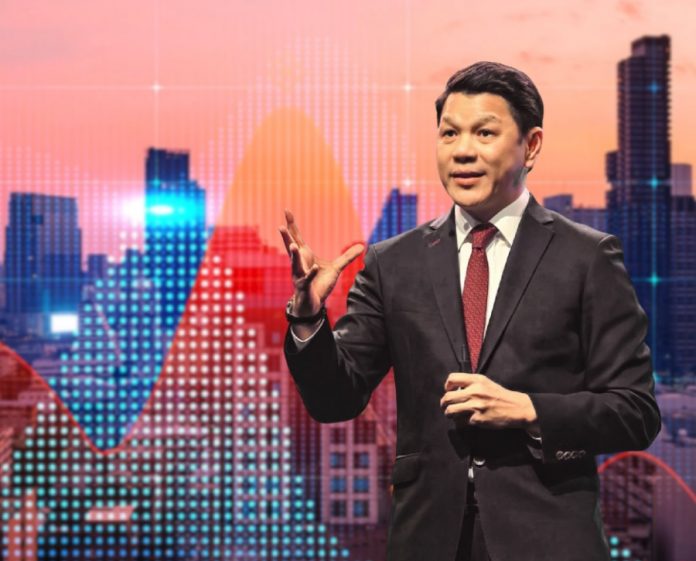#thethailandersnews
นายวิทัย รัตนากร ผู้อำนวยการธนาคารออมสิน และแคนดิเดตคนสำคัญในตำแหน่งผู้ว่าการธนาคารแห่งประเทศไทย (ธปท.) แสดงความเห็นถึงเศรษฐกิจไทยในปัจจุบันว่า ไม่ดีและอาจซึมยาว จากทั้งปัจจัยภายในและภายนอก โดยเฉพาะการส่งออกและท่องเที่ยวที่เริ่มสะดุด รวมถึงความไม่แน่นอนจากนโยบายภาษีของสหรัฐฯ ปัญหาใหญ่กว่านั้นคือ “โครงสร้างเศรษฐกิจ” ที่เต็มไปด้วยโจทย์ยาก เช่น หนี้ครัวเรือนที่พุ่งสูง การกระจายรายได้ที่ไม่ทั่วถึง สังคมสูงวัย และความไม่แน่นอนทางการเมือง ซึ่งเขาย้ำว่า ไม่มีทางแก้ได้ด้วยมาตรการเดียวหรือใครคนใดคนหนึ่ง แต่ต้อง “ร่วมมือกันทุกฝ่าย”
ในด้านการแก้ไขปัญหาหนี้ครัวเรือนของไทยซึ่งอยู่ในระดับสูงถึง 16.4 ล้านล้านบาท หรือคิดเป็น 87% ต่อ GDP ณ ไตรมาสแรกปี 2568 นายวิทัยเสนอ 3 ทางหลัก ได้แก่ หนึ่ง เร่งให้ GDP โตเร็วกว่าเงินเฟ้อ เพื่อให้รายได้ของคนไทยเพิ่มขึ้น และหนี้ลดลงเมื่อเทียบกับขนาดเศรษฐกิจ สอง ลดดอกเบี้ย เพื่อให้ประชาชนจ่ายหนี้ได้ง่ายขึ้น ตัดเงินต้นได้มากขึ้น หนี้ก็จะลดลงเร็วขึ้น และสาม เตรียมมาตรการพิเศษบางอย่างที่ยังไม่เปิดเผย แต่เน้นว่า “ต้องทำจริง และทำร่วมกัน”
นายวิทัยยังยกตัวอย่างบทบาทของธนาคารออมสินในฐานะ “ธนาคารเพื่อสังคม” ที่เน้นการสร้างความครอบคลุมทางการเงิน (Financial Inclusion) โดยให้กลุ่มผู้มีรายได้น้อยหรือกลุ่มอาชีพเสี่ยง เช่น พ่อค้าแม่ค้า ไรเดอร์ และพนักงานบริการ เข้าถึงสินเชื่อในระบบได้ แม้ไม่มีประวัติเครดิตมาก่อน โดยออกแบบสินเชื่อวงเงินต่ำ ระยะเวลาผ่อนสั้นไม่เกิน 12 เดือน เพื่อบริหารความเสี่ยงและสร้างวินัยทางการเงินให้ลูกหนี้กลุ่มเปราะบาง พร้อมทั้งนำกำไรจากผลิตภัณฑ์เชิงพาณิชย์มาสนับสนุนสินเชื่อเพื่อสังคม ซึ่งเป็นโมเดลที่ธนาคารยินดีรับความเสี่ยงบางส่วนเพื่อเปิดโอกาสให้คนกลุ่มใหม่ๆ เข้าสู่ระบบเศรษฐกิจอย่างเป็นธรรม
ทั้งหมดนี้สะท้อนแนวคิดของนายวิทัยที่ไม่ได้มองแค่ตัวเลขมหภาค แต่มุ่งเน้นการ “ลงมือทำ” เพื่อให้คนตัวเล็กๆ ในระบบเศรษฐกิจมีโอกาสลืมตาอ้าปาก และช่วยกันพาเศรษฐกิจไทยเดินต่อไปได้อย่างแท้จริง
Withai Ratanakorn, President of the Government Savings Bank and a key candidate for the position of Governor of the Bank of Thailand (BoT), shared his views on the Thai economy, stating that it is currently in poor condition and may remain sluggish for an extended period. He pointed to both internal and external challenges, particularly the slowdown in exports and tourism — the country’s main economic drivers — as well as uncertainty from U.S. tax policies. More critically, he emphasized that Thailand is facing deep-rooted structural issues, including high household debt, income inequality, an aging society, and ongoing political instability. These problems, he stressed, cannot be solved by any single policy or institution, but require collective, coordinated action.
On the issue of household debt, which stood at 16.4 trillion baht — or 87% of GDP in Q1 2025 — Withai proposed three key strategies: First, accelerate GDP growth beyond the inflation rate to raise incomes and reduce the debt-to-GDP ratio. Second, lower interest rates to ease repayment burdens and allow people to pay down more principal, helping to reduce overall debt faster. Third, introduce special debt relief measures, the details of which are yet to be revealed, but which he emphasized must be practical and carried out collectively.
Withai also highlighted the role of the Government Savings Bank as a “social bank,” working to promote financial inclusion. He cited efforts to help low-income earners and high-risk groups — such as street vendors, delivery riders, and service workers — access formal credit even without prior credit history. These loans are designed with small amounts and short repayment terms of no more than 12 months to manage risk and encourage financial discipline. Profits from commercial lending are reinvested into socially driven programs, with the bank willing to absorb some risk to give underserved communities a fair chance to enter the formal financial system.
Altogether, Withai’s vision goes beyond macroeconomic figures. It focuses on real, hands-on solutions to empower everyday people and ensure that the Thai economy can move forward in a more inclusive and sustainable way.
#BoTGovernor #WithaiRatanakorn #ThailandEconomy #MonetaryPolicy
















